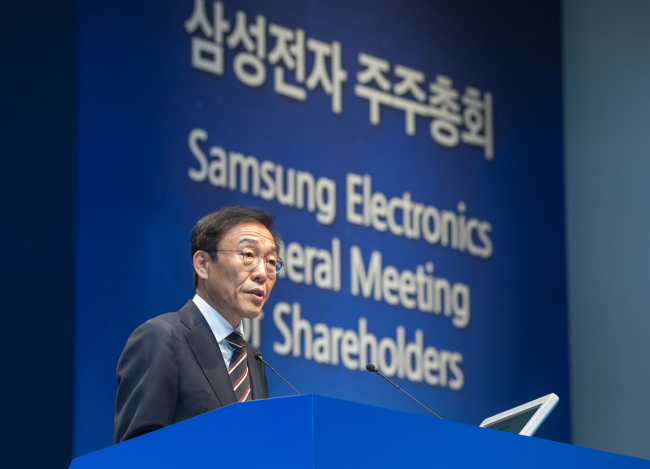Samsung
Govt, Samsung put heads together to respond to Japan’s export curbs
Minister of Economy and Finance Hong Nam-ki reportedly met Samsung semiconductor chief Kim Ki-nam on July 2 in Seoul in the wake of Japan’s moves to impose restrictions on exports of materials crucial to the semiconductor and display businesses, according to news reports on July 3.
The meeting came after the ministry called an urgent meeting with government agencies to respond to the recent trade dispute, and was aimed at finding ways to weather the looming challenges in the chip and display industries that will be caused by the trade spat with Japan, according to local news outlet Money Today.
 |
Samsung Vice Chairman Kim Ki-nam speaks during the 50th general meeting of shareholders held at the firm’s office in Seocho-dong, southern Seoul, on March 20. Samsung Electronics |
Yoon Book-keun, a Samsung vice chairman who is in charge of corporate relations, also companied the two.
A Samsung spokesman kept mum on the issue, saying, “Samsung is cautious of making any official comment since it is linked to relations between the two governments.”
Korea’s exports mostly driven by semiconductors, electronics and petrochemical products have been on a downward trend for the past seven months.
Last month alone, the Korean semiconductor sector saw the export volume drop by 25.5 percent on-year.
Japan is one of the largest exporters of fluorinated polyimide, hydrogen fluoride and resists, which are used in producing chips and displays for smartphones and TVs. Polyimide, for example, is a crucial component for flexible OLED displays for smartphones, which means the restrictions, scheduled to go into effect from July 4, could affect Samsung’s smartphone business.
Most of its smartphones utilize flexible OLEDs, and its upcoming flagship Galaxy Note 10 and foldable smartphone Galaxy Fold require the display material. Samsung also supplies, through its subsidiary Samsung Display, the flexible OLED displays to Apple. Market watchers forecast that prolonged export regulations could cause a supply bottleneck for global smartphone makers, including Samsung, Apple and Huawei.
Local analysts expressed mixed views over the trade conflict with Japan. Some claimed Japan would not be able to rely on the retaliatory moves for a long term since it could lead to havoc in the global markets for chips, smartphones and electronics while others said the shortage of raw materials could bring some benefits for Samsung’s memory chip business.
“The US restrictions on Huawei Technologies affected the demand side while the Japanese restrictions would cause an impact on the supply side,” said Noh Geun-chang, an analyst at Hyundai Motor Investment & Securities, adding, “It would somehow lift the price of memory chips, which are cash cow products for the Korean tech giant.”
By Kim Young-won (wone0102@heraldcorp.com)






![[From the Scene] Gigantic Olive Young store lures young trend-setters in Seongsu](http://res.heraldm.com/phpwas/restmb_idxmake.php?idx=151&simg=/content/image/2024/11/21/20241121050065_0.jpg)

